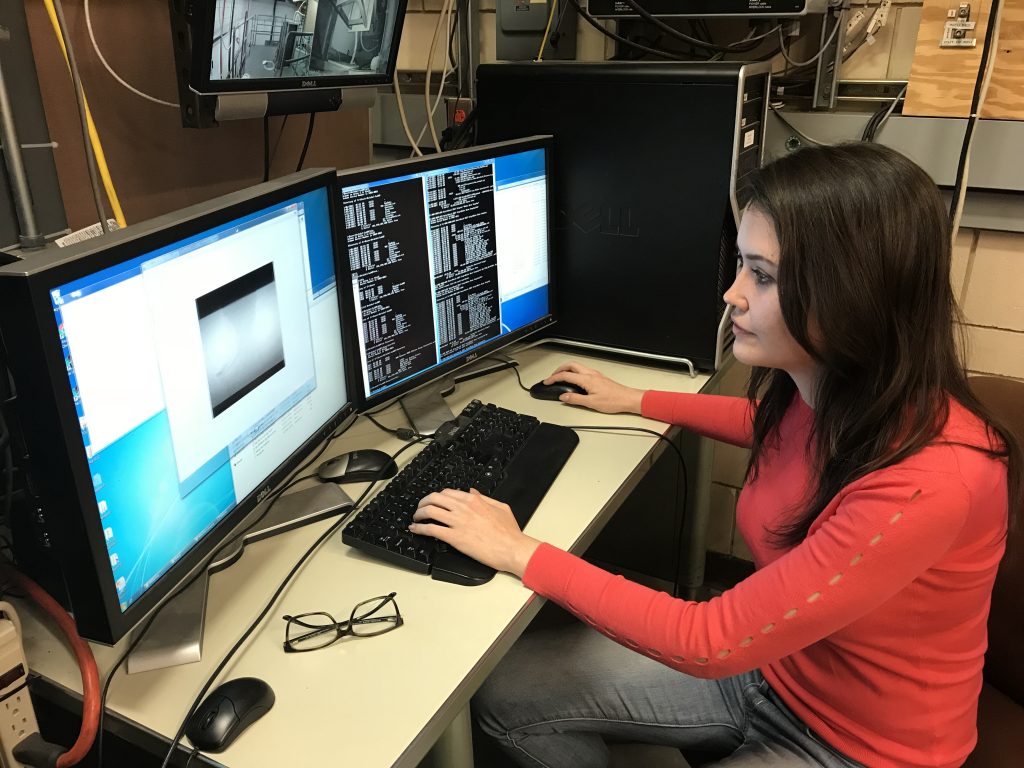
Mechanical engineering graduate student Julie Bothell recently received $2500 from the Iowa Space Grant Consortium for her research related to multiphase X-ray radiography.
Her current project is entitled “X-Ray Imaging of the Spray from a Coaxial Air Blast Atomizer” and is a collaborative effort between Iowa State and four other universities: Cornell University, University of Florida, University of Illinois – Champaign-Urbana, and University of Washington. Bothell said the main goal of the research is to “actively control a spray.”
“One of the main places that we see a use for this is in the fuel injection system of jet engines,” said Bothell. “Right now, the fuel injection systems are optimized for cruise conditions. But, if it were possible to actively control the spray inside of the engine, it would be possible to optimize for take-off, landing, and any other condition that the jet has to go through. Because this research is fundamental research of sprays, our findings could also be useful in paints, coatings, in industrial systems, or anything else that uses sprays.”
However, Bothell said that they need to learn more about spray fundaments before figuring out how to control them. To learn more about this, they are focusing on the spray that is close to the nozzle. Specifically, she’s looking at the part of the nozzle where the spray begins to take its shape.
“To study this, we use X-ray imaging because X-rays can penetrate the liquid even when visible light can’t,” said Bothell. “We take the X-ray images with a high-speed camera and can then go back and play them in slow motion. By doing this we are able to see the way that the liquid breaks up and becomes droplets and then more droplets and more droplets until there is a spray. This characterization provides us with the information necessary to start controlling the spray.”
Bothell works in the lab of Ted Heindel, Bergles Professor of Thermal Science in mechanical engineering. Heindel said Bothell’s current research project fits in nicely with the focus of his Experimental Multiphase Flow Laboratory in Black Engineering Building.
“Sprays are a very complex multiphase flow, and Julie is part of a large team working to increase our understanding of the spray formation process,” Heindel said.
Bothell began developing an interest in science and engineering when she was in elementary school.
“I knew that I wanted to be in science after participating in the science fair in fourth grade. Then, I decided to pursue engineering when I was in high school. The idea of combining science and math to create new products and technology really appealed to me,” she said.
She earned her BS in aerospace engineering from Iowa State but decided to switch to mechanical engineering for her graduate studies because she thought it offered her more flexibility with her research and career possibilities. She said that she thinks there is a lot of overlap between the two fields.
“The research I am doing now is in fluid flow which is a prevalent topic in both fields,” said Bothell. “In aerospace a lot of the research is dealing with air so they study things like the boundary layer of air as it’s flowing around a wing. In mechanical engineering there are studies that primarily focus on air flow but there are also a lot of studies in fluid flow that deal with liquids or even solids that are entrained in liquids. Mechanical really is just a broader field.”
Heindel also said that he think’s Bothell’s undergraduate background in aerospace engineering has contributed positively to her coursework and research as a graduate student in mechanical engineering.
“The study of fluid mechanics is common to both aerospace engineering and mechanical engineering, and Julie’s understanding of this area has certainly helped with her spray research,” he said.
Bothell hopes to complete her PhD in spring 2020 and said she would like to continue to do impactful research when she pursues a career after graduation.
“I’d really like to work at a National Lab or another large lab. When I chose to do a PhD, I did it because I really enjoy doing research. It appeals to me because the discoveries that are made in research form our understanding of how the natural world works. That understanding is what forms our knowledge as a species and it’s also what makes new innovations possible. So, my real career aspiration is to make discoveries that will lead us all to a better future,” she said.